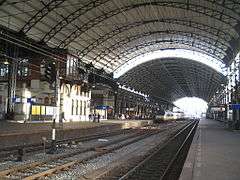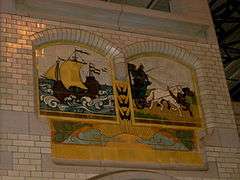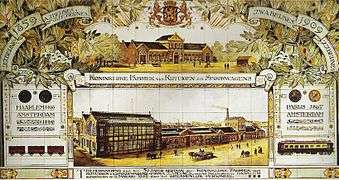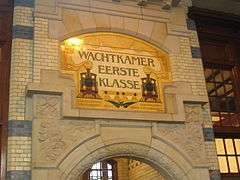Haarlem railway station
Haarlem | ||||||||||||||||||||||||||||||||||||||||||
|---|---|---|---|---|---|---|---|---|---|---|---|---|---|---|---|---|---|---|---|---|---|---|---|---|---|---|---|---|---|---|---|---|---|---|---|---|---|---|---|---|---|---|
|
Main entrance, built in the 1900s | ||||||||||||||||||||||||||||||||||||||||||
| Location | Netherlands | |||||||||||||||||||||||||||||||||||||||||
| Coordinates | 52°23′16″N 4°38′20″E / 52.38778°N 4.63889°ECoordinates: 52°23′16″N 4°38′20″E / 52.38778°N 4.63889°E | |||||||||||||||||||||||||||||||||||||||||
| Operated by | Nederlandse Spoorwegen | |||||||||||||||||||||||||||||||||||||||||
| Line(s) |
Amsterdam–Rotterdam railway Haarlem–Uitgeest railway Haarlem–Zandvoort railway | |||||||||||||||||||||||||||||||||||||||||
| Platforms | 6 | |||||||||||||||||||||||||||||||||||||||||
| Other information | ||||||||||||||||||||||||||||||||||||||||||
| Station code | Hlm | |||||||||||||||||||||||||||||||||||||||||
| History | ||||||||||||||||||||||||||||||||||||||||||
| Opened | 20 September 1839 | |||||||||||||||||||||||||||||||||||||||||
| ||||||||||||||||||||||||||||||||||||||||||
| Location | ||||||||||||||||||||||||||||||||||||||||||
 | ||||||||||||||||||||||||||||||||||||||||||
Haarlem railway station is located in Haarlem, the Netherlands. The station opened at September 20, 1839 on the Amsterdam–Rotterdam railway, the first railway line in the Netherlands. The station building itself is a rijksmonument.
History
The first, wooden station was built on the Oude Weg, just outside the Amsterdamse Poort in 1839 to accommodate the passengers of the first railway in the Netherlands between Haarlem and Amsterdam, which had a broad gauge rail width of the Dutch broad gauge 1,945 mm (6 ft 4 9⁄16 in).[1] The station was built outside the city, on the current location of the Centrale Werkplaats (maintenance depot) of the Hollandsche IJzeren Spoorweg-Maatschappij. At great expense, the rail width was later reduced to 1.435 metres (4 ft 8 1⁄2 in) in order to conform to George Stephenson's standard gauge.[1] The train engine "De Snelheid" was the twin of the Amsterdam "Arend", which along with the carriages, were designed by Stephenson's apprentice, the English rail engineer Thomas Longridge Gooch of R.B. Longridge & Co.[1] There were 4 trains per day to Amsterdam, scheduled at 9:00, 14:00, 16:00, and 18:00. The prices of the tickets for 1st (closed carriage), 2nd, and 3rd class (char-à-banc) were 1.20, 80c, and 40c (guilders).[1]

A few years later the new railway turned out to be a great success, and in 1842 a real station was built on the current location. It was designed by F.W. Conrad in a semi-Greek neo-classicistic style. The front of the building was open to the street.
Mouthaan
In 1867 the station was re-designed by P.J. Mouthaan; an extra floor was put on the building and the front of the building was now closed as well.
Current station
The current building was built between 1906 and 1908. The design is by D.A.N. Margadant. It was elevated, to make way for the traffic in the city. It is the only train station in the Netherlands that is built in Art Nouveau style.
Train services
The following train services currently call at Haarlem:
- 2x per hour intercity service Amsterdam - Haarlem - Leiden - The Hague
- 2x per hour intercity service Amsterdam - Haarlem - Leiden - The Hague - Rotterdam - Dordrecht
- 2x per hour intercity service Alkmaar - Haarlem (Only on weekdays rush hours in the peak direction)
- 2x per hour local service (sprinter) Hoorn - Alkmaar - Uitgeest - Haarlem - Amsterdam
- 2x per hour local service (sprinter) Zandvoort - Haarlem - Amsterdam
- 2x per hour local service (sprinter) The Hague - Leiden - Haarlem
- 2x per hour local service (sprinter) Zandvoort - Haarlem (summer only)
Bus services
All services except line 50 are operated by Connexxion, line 50 is operated by Arriva.
- 2 Haarlem Noord - Station - Spaarnwoude
- 3 IJmuiden - Driehuis - Velserbroek - Haarlem Noord - Station - Schalkwijk
- 8 Haarlem - Hogeschool Inholland - Overveen - Haarlem
- 14 Heemstede-Aerdenhout - Haarlem - Haarlem Noord - Spaarndam
- 15 Station - Waarderpolder - Spaarnwoude
- 50 Haarlem - Heemstede - Bennebroek - Hillegom - Lisse - Sassenheim - Leiden
- 73 Uitgeest - Heemskerk - Beverwijk - Velserbroek - Haarlem Noord - Haarlem - Schalkwijk
- 75 IJmuiden aan Zee - IJmuiden - Driehuis - Haarlem Noord - Haarlem
- 81 Haarlem - Bloemendaal aan Zee - Zandvoort
- 84 Haarlem - Bloemendaal aan Zee - Zandvoort
- 140 Haarlem - Heemstede - Hoofddorp - Aalsmeer - Uithoorn
- 175 Haarlem - Amstelveen - Amsterdam Bijlmer ArenA
- 176 Haarlem - VU - Amsterdam Zuid
- 177 Haarlem - Badhoevedorp (- Schiphol Oost)
- 277 IJmuiden - Haarlem - Schiphol Airport (peak hours only)
- 300 Haarlem - Schalkwijk - Vijfhuizen - Hoofddorp - Schiphol Airport - Amstelveen - Amsterdam Bijlmer ArenA
Gallery
 Inside Haarlem station today.
Inside Haarlem station today. 1900s decoration depicting the history of the Amsterdam-Haarlem train route from the trekschuit to carriageway along the haarlemmertrekvaart.
1900s decoration depicting the history of the Amsterdam-Haarlem train route from the trekschuit to carriageway along the haarlemmertrekvaart. In this commemorative tile tablet for Beijnes, now in the Spoorwegmuseum, the old Beijnes factory across from the Haarlem station can be seen, that was built in the same style as the station itself in 1867. The Beijnes hall and workshop was situated across from the station, and is where the train locomotives were serviced and where the train and tram carriages were made.
In this commemorative tile tablet for Beijnes, now in the Spoorwegmuseum, the old Beijnes factory across from the Haarlem station can be seen, that was built in the same style as the station itself in 1867. The Beijnes hall and workshop was situated across from the station, and is where the train locomotives were serviced and where the train and tram carriages were made. Waiting room first class; the cow-catchers depicted on the train engines are historically inaccurate and were never found on Dutch train engines.
Waiting room first class; the cow-catchers depicted on the train engines are historically inaccurate and were never found on Dutch train engines.- 1939 tile memorial plaque celebrating 100 years of railway history shows accurate early engine on the left.
Trivia
- The scenes in the 2004 film Ocean's Twelve that are meant to portray Amsterdam Centraal station were actually shot on platform 3a at Haarlem station.[2]
References
External links
| Dutch Rijksmonument 19786 |
- NS website (English)
- Dutch public transport travel planner (English)
- Connexxion website (Dutch)
- Haarlem Shuffle - Central Railway Station